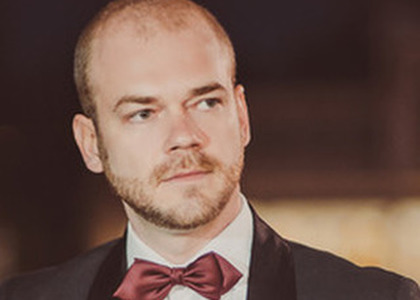> [Archived] Interviews

Beautiful minds – Interview with Traian Boală
The quartet ''Arcadia'' is well known in the field of Romanian chamber music, which makes Traian Boală, member of the ensemble, the guest of the week within the rubric''Beautiful minds'' made by Petre Fugaciu.
I would like us to begin with a few important moments in the history of Quartet Arcadia. What determined you to found this ensemble and how would you describe the first years of activity?
Arcadia quartet was founded a few years before I joined my colleagues in 2006, with the occasion of a quartet contest here in Cluj, Mozart Contest. Participating and winning the first place united my colleagues, so they decided to stay together. Back then Marcel Cameniță was playing the viola and the activity was quite intense in the first three years, but Marcel decided to move back love to Arad, and that is when they called and asked me if I want to join their quartet. It was a very pleasant surprise for me because I dreamed about being a part of a hight quality quartet since I was in my first year of collage. This was my dream, my aim, to be a part of a high quality quartet and when they called me it came as a wonderful surprise and I started working with them. These happened in 2009. The first years were quite interesting because I moved to Cluj already in the first summer and we started rehearsing for two international contests: one in Hamburg and one in Lugano, Switzerland. We had a repertoire of nine quartets in that summer, two by Bartók. After those two months we succeeded and managed to win both of the contests, even the contest in Hamburg was passed with flying colours, and we won multiple prizes, not only the first place. Basically, these two contests built us the foundation of our era, because the contests brought us our first manager and things worked gradually good.
By definition, a quartet is a band resulted from the collaboration of multiple musicians, thus, there is never only one career at stake, only a set of expectations or a single definition of success. How are all of these balanced throughout time?
They find a balance because there is actually only one way, one career and it is common, it cannot really work otherwise. When it comes to a four people group, if the target is common, the insight, the wishes, the expectations, the availability for sacrifice and work, patience… if they are similar to all four, all four are going to pull the same ''carriage'', so to say, and the chances of succeeding, of accomplishing that insight materialize.
So you were saying that it was a dream of yours to become member of the quartet?
Yes, yes. In my first year of collage I attended a recital of Gaudeamus Quartet, where professor Leona Varvarichi from the National University of Music performed. I attended that recital and I was so impressed that I came to the conclusion that this was the thing I wanted to do in my career as a musician.
What exactly drew you to the chamber music area compared to a soloist career or a pedagogical one, for instance?
First of all, I think the complexity, although I dare say it is more than complexity,it is a complete aspect that you encounter in chamber music. The fact that at the same time, as a musicianyou are also a chamber musician, you are also a conductor, you are also a tuttist or a member of an ensemble, trying in eachmoment to maintain a balance in all these aspects, because you combine the vision of the work onwhich a conductor would have with the related movements to suggest entrances or rhythms, just like features a conductor; you are a soloist, because your voice is your responsibility and you are a tuttist,because at every moment you have to hear what is happening around you, to know how to fit in, toadapt to an ensemble. This complexity and the sonority itself of the quartet won me over to that one recital.
Arcadia Chamber Music Classes reached their 3rd edition this year. I imagine it wouldbe quitedifficult for you to tell me what the pupils and students have learned from you in the first two editions, so I would prefer to ask you, what have you learnedfrom them at this time?
Always when we have this masterclass in the summer, but also in general when I work with students, I havelearned primarily through the desire to express, explain and exemplify a certain viewwhich I have or which many have; I realize, and I understand how well I actually know about that phenomenon. When I can explain coherently and clearly and accuratelyevery aspect, then I realize that for me it is very clear. When that doesn't happen,I realize I have some extra things to understand. Teaching is always whateducates me the most. That on the one hand. On the other hand, it is always nostalgic forme to notice the stages in which the course participants are, because I remember the stages through whichI passed, the emotions along with the perspectives, and with the intentions that I also had. This is how I learn torelate more correctly to the past and plan my future better.
Translated by Mara-Sabina Rolea,
University of Bucharest, Faculty of Foreign Languages and Literatures, MTTLC, year II
Corrected by Silvia Petrescu














